SI Vault: Jake Plummer walked away from NFL to find true happiness

You have to wonder why a red-blooded American male in his prime would walk away from fame and fortune as an NFL quarterback to play handball and hang with his family and dogs. Don't you? As we celebrate the Fourth of July this week, a look back at how Jake Plummer, who seemingly had The American Dream in his hand, abruptly walked away from it all at the age of 32. The death of his friend Pat Tillman helped him make his decision, as he realized that, in Plummer's own words, "there's so much more to do in life." This story originally appeared in the February 14, 2011 issue of Sports Illustrated. To subscribe to the magazine go here.
In the summer of 2007 Buccaneers coach Jon Gruden flew seven hours from Tampa to Spokane. There he rented a car and drove 44 miles east to Coeur d'Alene, Idaho. His traveling partner was Bruce Allen, the Bucs' general manager, and they carried with them two footballs and a pair of new cleats. Shortly after 6 p.m. the duo walked into Capone's, a sports bar in Coeur d'Alene where people gather to watch Broncos games, play pool and drink $3 Molsons.
Ten minutes later Jake Plummer and his wife, Kollette, walked in. Gruden rose and mustered all of his considerable charm, pumping Jake's hand and telling him how excited he, Jon Gruden, guru of quarterbacks, was to sit down and talk football with Jake Plummer, the ultimate gunslinger. Beers were consumed, pizzas were ordered. By and by, Gruden and Allen made their pitch. Two months earlier the Buccaneers had made a trade with the Broncos for the rights to Plummer, even though he had announced that he was retiring from the NFL at age 32. In doing so, Plummer not only walked away from the game in his prime—he'd led the Broncos to the AFC Championship Game a season earlier—but also turned down the $5.3 million he would've earned during the 2007 season.
Gruden leaned in and started selling. Join us in Tampa Bay, he said, and with our defense and your leadership we'll have a shot at the Big One. Come to Florida, he said, and you'll be the hero you could never be in Denver in the shadow of John Elway. And then the kicker: Sign with us, Gruden whispered, and we'll donate a million dollars to your Alzheimer's foundation.
Plummer looked at the two men, considered the offer and said, "That sounds sweet, man." Then he took a swig of his beer. As he did, he couldn't help but notice that, under the table, Allen had extended his fist to Gruden, who gleefully tapped it with his.
Anthony Hargrove remains in football exile years after Bountygate scandal
Jake Plummer never went to Tampa Bay, of course, just as he never offered his services to any other NFL team. Upon retiring in March 2007, he held a press conference at the Denver Athletic Club. Grasping a lectern, he told a crowd of reporters that he was "running away from the game" but not in "fear or fright." He credited his teammates for his success, invoked his friend Pat Tillman and pointed to his chest and promised that "there will not be a jersey with an NFL patch here." He said he was excited to move on and "take on new challenges," because "life is grand, life is exciting." Then, without taking questions, Plummer bid goodbye and walked down the hall to play a doubles handball match with his brother Eric.
And after that? Well, after that Jake Plummer pretty much disappeared, at least by the standards of modern pro athletes. He moved to Sandpoint, a town of 8,300 people in northern Idaho, a short drive from the Canadian border, where he lives five minutes from Eric and within an hour of his dad, Steve. So far Plummer hasn't surfaced to do TV commentary or Dancing With The Stars or tweet or scribble his signature at an autograph show. He hasn't hinted at a comeback, and other than to promote handball, a game his family holds near and dear, he has kept his distance from the media.
Still, in the wake of another Super Bowl, people might think about Plummer on occasion and wonder, ‘What the hell was he thinking?’ After all, when asked to name their dream job, American men overwhelmingly choose pro athlete over movie star or president of the United States. And no pro athlete is as mythologized as the quarterback. He's Joe Namath guaranteeing a Super Bowl victory, Joe Montana lofting perfect spirals, Tom Brady squiring the most beautiful woman on the planet. Who in his right mind would walk away from such a job? Who requests a wake-up call from the American Dream?
Jake Plummer is amped up. It is a fall weekend in 2010, and in a few minutes he'll be playing a pro-am handball match. From his rumpled blue sports bag he pulls out a Ziploc bag full of white pellets, tosses two into his mouth and takes a swig of beer from a red plastic cup. "I know it looks nasty," he says of the spearmint-gum-and-Bud-Light combo, "but it really wakes me up."
Gary Kubiak on his return to Denver and working with Peyton Manning
Properly jazzed, Plummer hops onto the court and engages in a spirited warmup, leaping and raising his knees high and smacking his hands together. He is wearing a faded white T-shirt that says wonder bread, cutoff gray sweatpants, thick gray sweat socks and a grungy white headband. His hair is long and stringy, his beard robust. He looks as if he just wandered off the Appalachian Trail. Until he starts throwing, that is. Right-, then left-handed, Plummer fires the small, hard rubber ball against the front wall of the court, loosening up his arm. The ball detonates with remarkable violence. Crack! Crack! Watching him, lean and agile and powerful at 6'2" and about 195 pounds, it's hard not to conclude that, at 35, Jake Plummer could still be a damn good NFL quarterback.
In an hour Plummer will leave the court drenched in sweat and on his third T-shirt, grinning like a man at his own wedding and high-fiving his teammate. In 12 hours he will be at a bar with 20-odd handball players, acting as host and designated driver as they regale one another with tales of kick serves and back-wall shots and lives lived in translucent 30-by-40-foot glass boxes. And in 30 hours Plummer will be at his modest summer lake house outside Coeur d'Alene, with his dogs and his wife and his infant son, and he will be drinking a Molson and talking about why he left the NFL. But that is all to come. For now, let's go back to the last thing most Denver fans remember about Jake Plummer.
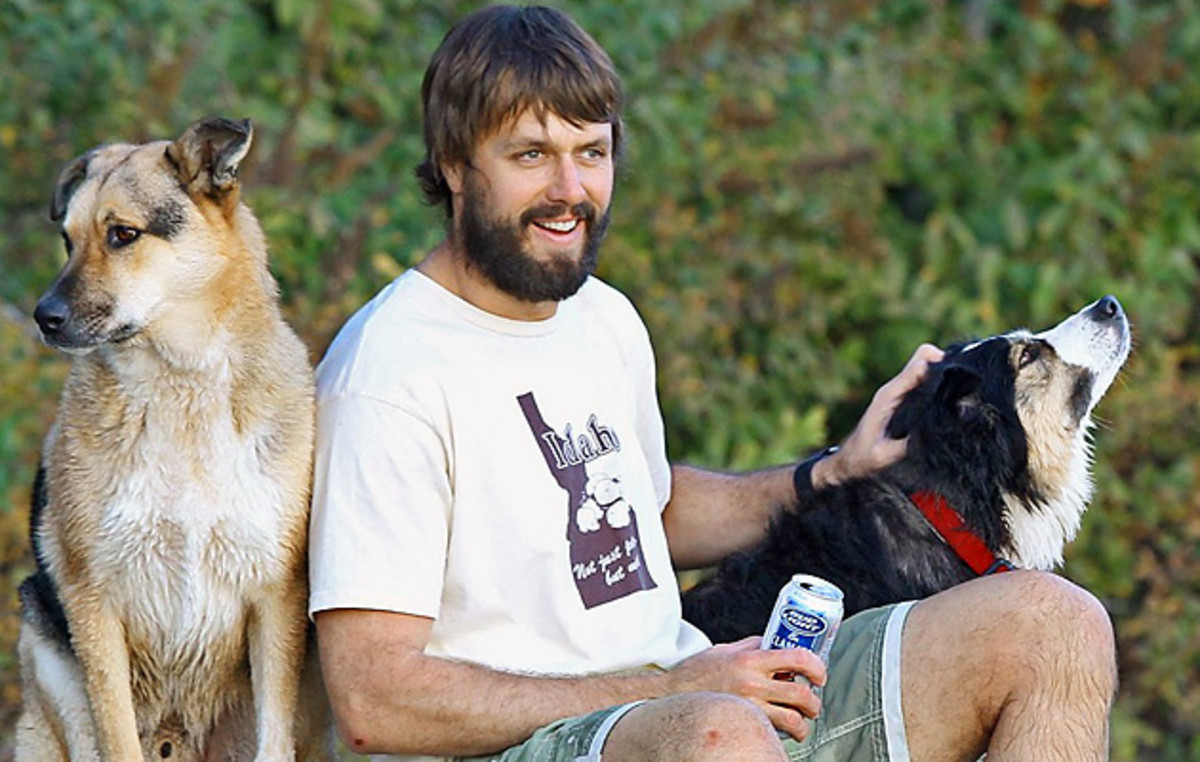
'Screw it,' thought Plummer, 'I'm going to win this thing.' It was the last game of the 2006 season, against the lowly 49ers, and he had been summoned from the Broncos' sideline. Only a month earlier, coach Mike Shanahan had benched Plummer, a 10-year veteran, in favor of a strong-armed but immature rookie, Jay Cutler. The team, which had been 7–4, faltered. One season removed from the AFC Championship Game, Denver was on the verge of missing the playoffs.
At first, Plummer, who'd been an All-Pro only a season earlier, had been angry about the demotion. Ever the optimist, though, he soon noticed a silver lining. Suddenly he could simply revel in the grandeur of the game, in the sights and smells of the stadium. He spent pregame warmups playing football golf with fellow backup Preston Parsons. He ate hot dogs at halftime, joked with fans. For 14 years he'd started every game for his college and pro teams, other than the first few of his freshman and rookie seasons. So now he could finally breathe in the world. "I was like, ‘Man, this is a blast’," he says. "I didn't study the game plan, I didn't have a clue what was going on."
Then, in the second quarter of the 49ers game, Cutler was sidelined by a crushing hit. So here was Shanahan, calling in Plummer. Shanahan, who had questioned Plummer's work ethic even though he was one of the team's best-conditioned players, who had ignored warnings by other players not to switch quarterbacks. (Even Cutler, after his first start, told Plummer the team would have won had he played, according to Stefan Fatsis's book A Few Seconds of Panic.) What's more, though Shanahan didn't know it, Plummer had made up his mind to retire after the season.
• MMQB 100: Jay Cutler has one last chance to make it work in Chicago
So how can you blame Plummer for doing what he did next—for going out on the field and trying to win the damn thing? "I just went for broke," Plummer says. "I remember Mike Bell went down for like a 60-yard play. And the first guy to pick him up was me. I was running alongside him. I was so psyched. I was running around, shouting at the other team, 'Jake the F------ Snake is back!'"
Parsons remembers the electricity, the stirrings of another Plummer comeback. "And he was doing it by basically saying f--- you to the coach," says Parsons. "Which is something all players wish they could do but no one has the guts to."
With a chance to extend the Broncos' 3–0 lead, Plummer says, "I rolled out to my left, made a guy miss and was like, ‘Ah, there goes Javon Walker, and I just heaved a Hail Mary.’" Plummer pauses. "And he trips, and the safety intercepts it."
With that, the magic was bottled. Shanahan put Cutler back in, but not before trying to chastise Plummer, who walked past, ignoring his coach. Quarterbacks coach Pat McPherson then walked over. "Gosh, you just really can't make that throw," he told Plummer. And that's how Plummer's football career ended, some would say fittingly: with a desperation pass picked off.
[pagebreak]
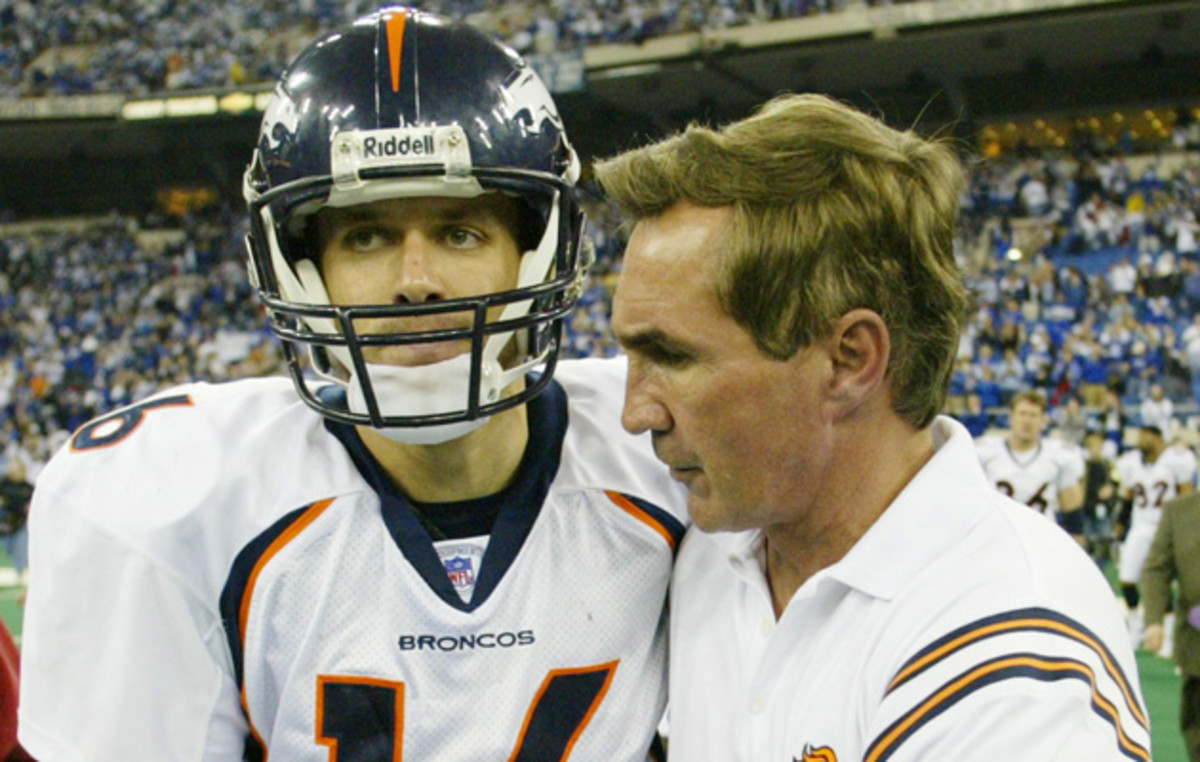
A few months later he retired, having achieved a 39–15 regular-season record as the Broncos' starter. His former agent, Leigh Steinberg, applauded the move. "I have virtually never met an athlete who willingly walked away from sports," says Steinberg, who at one point represented roughly half the quarterbacks in the NFL. "The courage and integrity is in knowing when you've had enough and being able to walk away from all the conventional markers of success. The courage is in choosing family and dignity over artificially extending a career just for the money. We should laud Jake Plummer for standing up for the best in American values."
Others saw it differently. "Good riddance," wrote Milo F. Bryant of the The Gazette in Colorado Springs. Bernie Lincicome of the Rocky Mountain News went further. "If Plummer is willing to run away from $5 million or so ... his spirit is as weak as his arm." Then Lincicome accused Plummer of "contradicting the soul of competition." He wrote, "We can accept that in ourselves but not in our heroes."
What is a hero? Who decides who qualifies as one? Growing up, Jake Plummer had a hero—two of them, actually. The third of three boys, Jake was included in every game his brothers, Eric and Brett, played, be it football, basketball or some contest improvised on the spot. To this day the trio (Brett is three years older than Eric, who is three years older than Jake) cannot gather without competing; when they went backpacking in the Sierras last fall, they played Frisbee golf at 10,000 feet.
• Audibles NFL Podcast archives | Sports Illustrated's podcast network
Home was Smiley Creek, a town of 50 in the foothills of Idaho's Sawtooth Mountains. Steve Plummer worked as a lumber wholesaler while his wife, Marilyn, taught at the two-room schoolhouse. (Steve and Marilyn split when Jake was eight years old but remain good friends.) Life was lived by certain rules, passed down and enforced by Marilyn's mother, Hazel Sounders, the matriarch of the family: Judge people by their deeds, not their appearance or status. Treasure friends and family. Look out for your own.
Handball became the family game after Steve learned it at the lumber warehouse, which had a makeshift wood court that was shorter, narrower and lower than a regulation handball court. (Indoor handball is played on the same court as racquetball, with nearly identical rules.) The warehouse pushed 100 degrees during the summer and was cold as hell in winter, but both of Steve's bosses played, so he did too. Soon he was good enough to win the C division at a local tournament, then the B, the A and finally, in 1976, the Idaho state open championship.
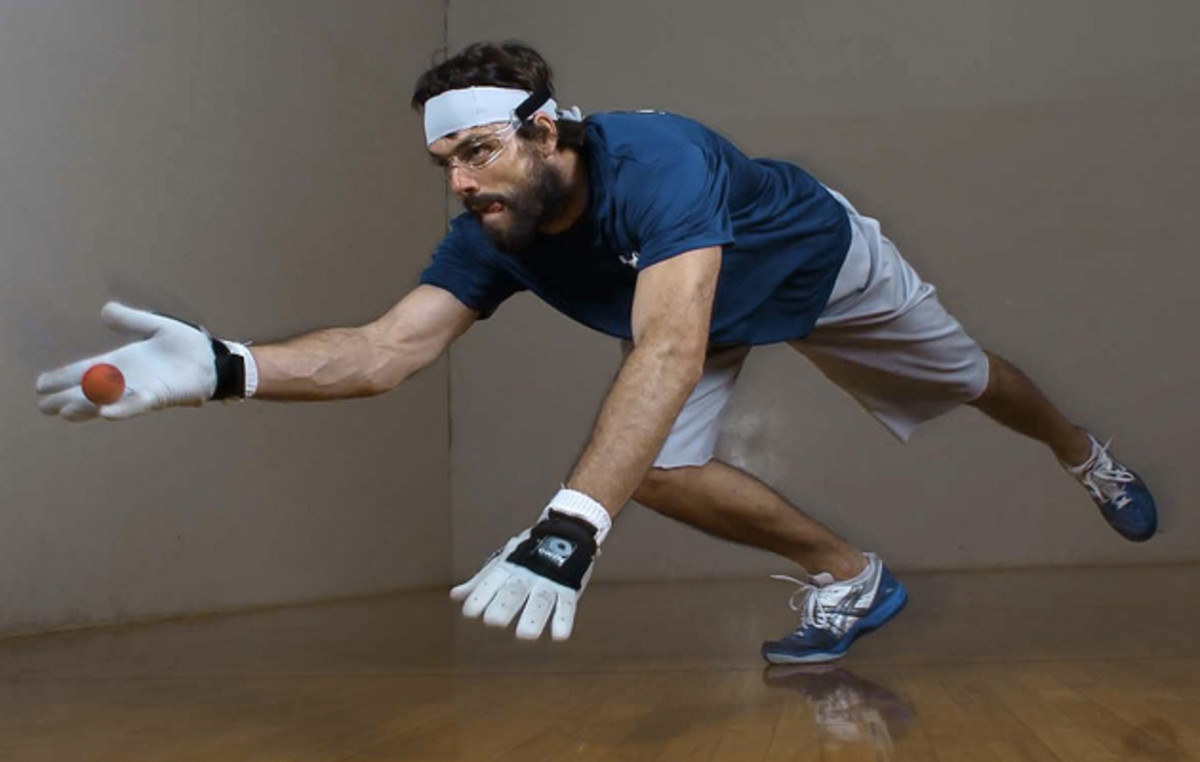
All the Plummer boys were athletes. Brett ran track at Brown and held the school record in the 800 meters. Eric was a safety in high school, then played club handball at Montana, making the national quarterfinals in 1990 and '91 despite being the only player on the team, which tells you all you need to know about both Eric's determination and the popularity of handball.
And Jake? He'd always been the little brother who got pushed around, though he had an intense competitive streak. When he was 11, in Pop Warner, he made more than 20 tackles in one game, becoming so wrapped up in the competition that between plays he burst into tears of excitement. In high school he excelled despite his wiry frame, and in 1993 Arizona State coach Bruce Snyder ruined a new pair of $300 shoes slogging through a snowstorm to reach the Plummer household. (Years later Jake would send Snyder a pair of Florsheims. "It was the least I could do," he says.) Six games into the '93 season Jake was starting as a true freshman for the Sun Devils, cocksure at 6' 2" and 170 pounds. In '97 he and the team's other cult hero, a relentlessly attacking linebacker named Pat Tillman, led ASU to within 100 seconds of a national title in the Rose Bowl.
• MMQB: Nate Boyer: My journey from the Army to the NFL
Plummer became the golden boy of the football-mad Southwest. Handsome and charismatic, he seemed to embody the go-go spirit of the region. His legend only grew when he was drafted by the hometown Cardinals, and in his debut in the seventh game of the season he entered midway through the fourth quarter and led the team on a 98-yard scoring drive, completing four of six passes for 89 yards. (The Cardinals lost in OT, but no one paid that much mind.) Fans adored him, the media praised his poise, and Bill Walsh declared, "I see Jake having a Montana-like career, including the Super Bowls." Not yet 25, Plummer was, as Cardinals wideout Chad Carpenter told SI at the time, "like a god." Said Carpenter, "We go to a restaurant and people stand up and clap when he walks by. No wonder he's a hermit." (Not entirely. In June 1997, before his rookie season with the Cardinals, Plummer pleaded no contest to misdemeanor disorderly conduct and was sentenced to two years' probation after four women at a Tempe nightclub accused him of groping them.)
Plummer's friendship with Tillman began at ASU and deepened with the Cardinals. Plummer was the team's come-hell-or-high-water leader, always scrambling and throwing tons of interceptions but also guiding the Cardinals to their first playoff victory in 51 years. Tillman was the undersized ball-of-fury safety who laid out opponents as if they'd just snatched his mother's purse. The two men were similar in many ways: Both shunned the spotlight, each was one of three brothers, both questioned authority and treated teammates like family.
Even though he was older, Plummer at times felt as though Tillman were his big brother. Tillman came to Plummer's football camp in Boise, Idaho, and spent nights cooking dinner at the home of Jake's Aunt Sue, all the while encouraging his friend to think critically. Plummer respected how, when Tillman disagreed with someone, he would say, "That's f----- up. Why do you believe that?" If the person gave a persuasive reason, Tillman was O.K. with it, but he hated being passive.
In the spring of 2002 Tillman quit football to join the Army. In January '04, after his first stint in Afghanistan, he returned to the U.S. on leave. That same month Eric Plummer entered a handball tournament in Seattle after a decade away from the game. He felt nervous, but then he heard fans chanting his name. He turned around to see Jake and Tillman, clapping and roaring. At the sight, Eric teared up (which he still does when he tells the story). After the match the three men headed to a dark bar off Pike Place Market and stayed deep into the night drinking beers and solving the world's problems. It would be the last time either Jake or Eric saw Tillman.
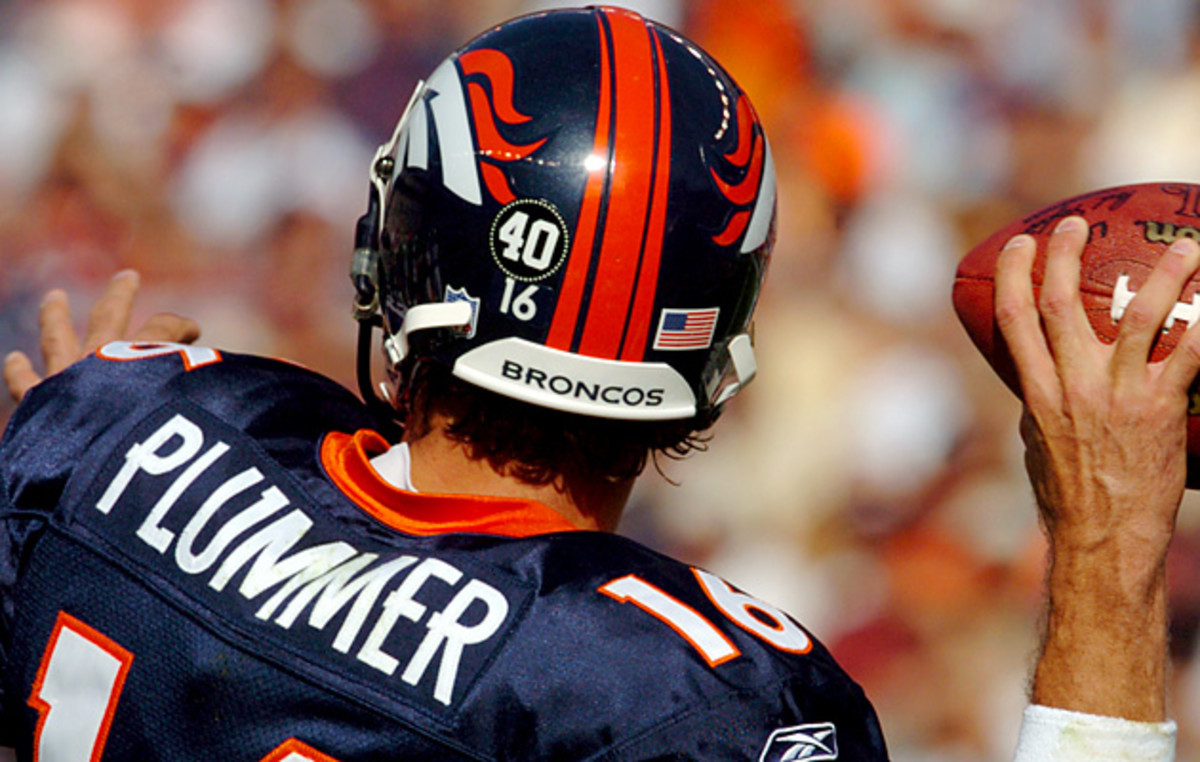
In April 2004, Tillman was killed by friendly fire in Afghanistan. Two weeks later, at the funeral, Jake walked to the podium wearing a suit and, in honor of his friend, flip-flops. He had been mulling what to say for weeks, and though at the time he meant the words as a testimonial to his friend, in hindsight they hinted at the path Plummer would choose. "I was in the store the other day and I saw PEOPLE magazine, and it had the cover of the 50 most beautiful people in the world, or America, and there was a picture of Pat," Plummer said. "It was kind of ironic because I really looked and said, What is beauty? Is beauty a pretty face, a nice smile, flowing hair, nice skin? Not to me, it's not. To me beauty is living life to higher standards, stronger morals and ethics and believing in them, whether people tell you you're right or wrong. Beauty is not wasting a day. Beauty is noticing life's little intricacies and taking time out of your busy day to really enjoy those little intricacies. Beauty is being real, being genuine, being pure with no facade—what you see is what you get. Beauty is expanding your mind, always seeking knowledge, not being content, always going after something and challenging yourself."
In closing, Plummer said, "I believe that to really honor Pat, we should all challenge ourselves. No more ‘I'm going to do this’ or ‘I'm going to do that.’ Do it. As Pat would say, probably, 'Get off your ass and do it.' Why, you ask, should we honor him this way? Because that's what Pat did his whole life."
[pagebreak]
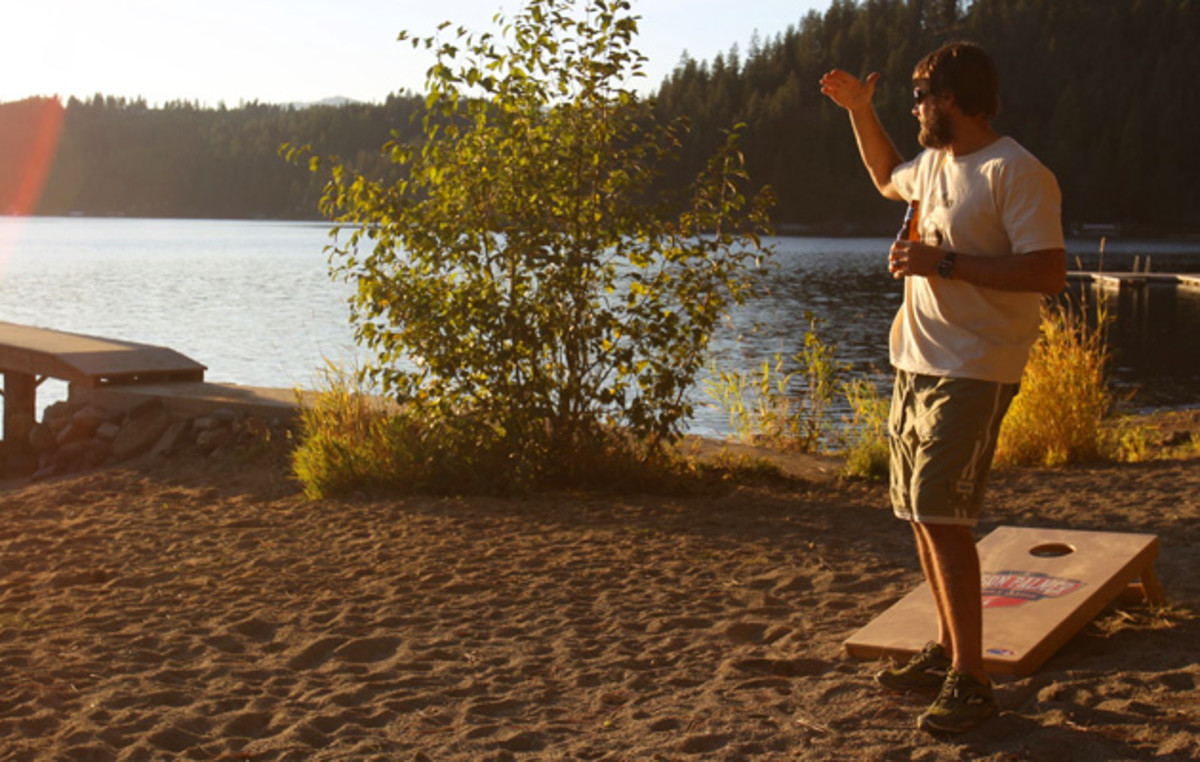
We all have dreams. Jake Plummer's was to hold a handball tournament. Not some big-time sponsored tournament but the kind at which everyone hangs out and drinks beer and has a great time. So three years ago, after he retired, that's what he did. In October he presided over the third annual Plummer Family Helluva Handball Bash at a modest athletic club in Coeur d'Alene, an hour from his home in Sandpoint.
It is Thursday, the day before the tournament, and Jake is posting fliers at a Days Inn. Wherever he goes, he walks in a semi-hurry, bent forward like a boy shouldering an overstuffed backpack, head jutting out. Today he's wearing cargo shorts, gray sneakers and a flannel shirt, which is pretty much what he always wears, unless it's cold, and then he wears cargo pants.
Plummer is disarmingly laid-back, the Dude from The Big Lebowski as a former All-Pro. He douses his sentences with "sweet," "man," "s---" and "dude," enjoys playing the bongos (a Saturday night tournament tradition) and becomes tremendously excited about seemingly mundane topics. Here he is talking to a couple of handballers about massage therapy: "I'm doing Rolfing now. You ever do Rolfing? No? You gotta do it. Oh, man, they dig in with their elbow, really working it out. [He pantomimes churning into someone's lats.] It's awesome."
In part because of his appearance but mostly because of his demeanor, Plummer is able to live in relative anonymity. One of his handball friends, Tye Barlow, tells how, a couple of years ago in Sandpoint, Plummer was volunteering for Meals on Wheels, and the organization ran into funding problems. The woman in charge put a hand on Plummer's shoulder. "Jake, I'm sorry, we're out of money this month. But keep track, and we'll pay you for your gas."
"Don't worry about it," replied Plummer.
She insisted. Again, Plummer assured her it was O.K. "No, Jake, you don't even have a job!" she said sternly. "You have to keep track of your miles. You need the money."
"I played in the NFL for a little while," Plummer said. "I'm O.K."
Dumbstruck, the woman appraised the scruffy man who'd been delivering food for months. "You're that Jake Plummer?"
So, yeah, Plummer's not big on announcing his celebrity. Later in the tournament weekend, at a bar with a bunch of handballers, he is twice elbowed out of the way by a chubby guy in his 20s who is wearing a Tim Tebow Broncos jersey and is intent on getting to the bathroom. Only at the end of the night, tipped off by his friends, does Fat Tebow come over and announce that he is a huuuge fan of Jake Plummer. Plummer smiles, accepts the compliment and then gives the kid grief for not wearing a Kyle Orton jersey.
Plummer's quest to be a regular guy is one reason he loves handball: No one in the sport treats him like a star. This was never more important to him than when he played in Denver, where he was relentlessly compared with Elway, who'd retired in 1998 after leading the Broncos to back-to-back Super Bowl titles. Plummer signed with Denver as a free agent in 2003, and surrounded by elite talent for the first time, he flourished, finishing the season with a career-best 91.2 passer rating and leading the Broncos to a wild-card berth. The following season he matched or surpassed a handful of Elway's passing records. But Plummer also did things Elway never did. Like flipping off a fan, getting into a traffic dispute with another driver, and berating a Denver gossip columnist for writing about his relationship with Kollette, whom he'd just begun dating. Before the AFC Championship Game in '06, Plummer met the press with shoulder-length hair and a scraggly beard, wearing jeans and a white undershirt. Lincicome called him Jake the Flake, while others preferred Jake the Mistake. Fans on talk radio wondered whether, if the Broncos made the Super Bowl, Plummer would screw it up.
Then again, while he was in Denver, Plummer also started that Alzheimer's foundation. (His grandfather Elwood Davis died of the disease.) He went to the animal shelter to walk dogs. (Upon leaving Denver, he wrote the shelter a personal check for 10 grand.) He befriended a boy who lost his father on 9/11, and he continued calling the boy and his sister for five years. Still, all that many fans saw was his public demeanor. "I don't react the best way every single time to certain situations," Plummer told The New York Times then, "but I think people see that I'm genuine and true, and they appreciate that."
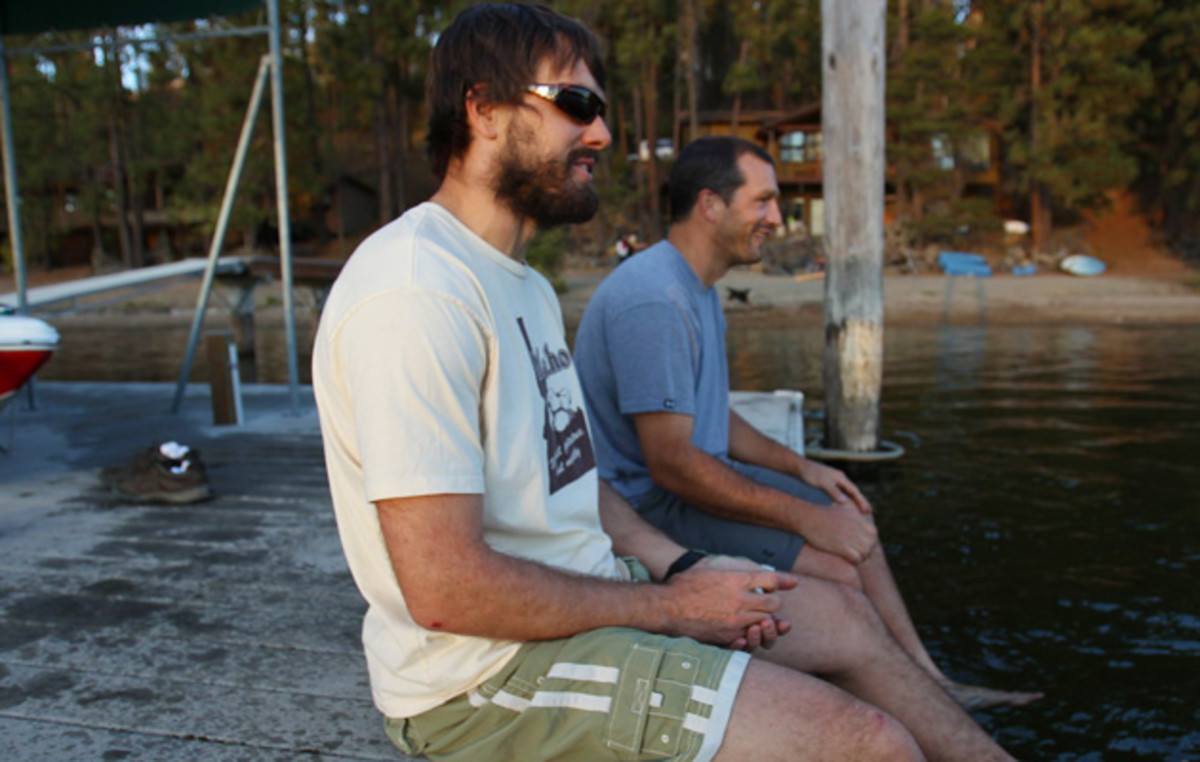
His teammates certainly did. Running back Mike Anderson told The Denver Post, "He puts on no airs. I love the guy. I'd go to battle for the guy every day of the year."
From the start, however, Shanahan and Plummer clashed. One wanted complete control; the other thrived only if not subject to it. "Shanahan used to kill me," says Plummer. "If I was 23 of 30 with two touchdowns, he'd say, Why didn't you go 25 for 30 with three touchdowns? I was like, We're beating someone by 21 points, how much more do you need to beat them by?"
Plummer needed an escape, and he found one when he began receiving letters that said, "We know about your dad. You should come down to the Denver Athletic Club and play handball." So he did. There, a bunch of old-timers beat the crap out of him—which, of course, Plummer loved. "It was so cool," he says. "They wouldn't take it easy on me. I was the quarterback of the Denver F------ Broncos, and it didn't matter. It was great."
So in February and March, after the NFL season, he'd play for hours at the DAC. When Broncos workouts rolled around and the team started running sprints, Plummer would coast in, not even breathing hard. "What the hell have you been doing?" his bent-over teammates would ask.
"Playing handball," he'd reply.
Silver Screen All-Pros: Starting lineup of cinema's best football players
Those same guys from the DAC now travel to Jake's tournament. So do another 100-plus recreational players and a dozen or so of the best pros in the world. Despite this, the tournament is exceedingly low-key. The day before it begins, there are no signs or fliers at the athletic club in Coeur d'Alene. Asked who is in charge, the club manager says simply, "Jake."
This is not an exaggeration. Plummer actually runs his tournament. He lugs in groceries, wheels in kegs, sets the match schedule and brings Gatorade to the players. Sometimes he does all this while cradling his four-month-old son, Roland, in one arm, though not like a football.
Around him swirl old men in goggles, scarily fit women in spandex, and sweaty, unshaven guys with knee braces. Handball calls to mind seniors with sun-wrinkled backs swatting at balls on New York City and Miami blacktops, and there are plenty of those types, men with hands like shovels, creased and calloused. The pros, however, are young and for the most part superbly conditioned. None make a real living off the sport—the only one on hand who tries is top-ranked Dave Chapman, and he runs clinics and sells DVDs. The game is top-heavy; while Plummer is one of the top 200 players in the world, in terms of talent he is the equivalent of a Division III player competing against NBA stars.
When it comes to enthusiasm, however, Plummer has few peers. Here he is at 6:30 p.m. on Friday, flitting between matches and marveling at the play. Now he's at Court 3, pointing at a skinny blond guy with a buzz cut. "This kid here, he's one of my favorites. When he started, someone gave him a pair of yellow work gloves, like you'd use for digging a ditch, and they'd fall off when he hit, so that's why he's always hitting with closed hands. Watch!"
Then Plummer is at the upstairs courts, watching the women's matches, telling everyone that they have to see this because the women are a-ma-zing. And now he's watching the pros and talking about the athleticism of the top guys. "It's like Randy Moss or Charles Woodson, right? Right?"
Off-season report card: Denver Broncos
When it's Jake's turn to play, he has a hard time switching modes. His first doubles match is on Saturday morning, when he is paired with a veteran pro named Danny Armijo, whose nickname is The Hand because of his preternatural ability to return shots. Armijo is something of a goofball and, at 48, a handball lifer, having turned pro at 15. Single, with a mop of brown hair and a soul patch, he is known to call WPH founder Dave Vincent before tournaments and leave voice mails such as, ‘Hey, this is Dan. I'm having trouble with my joints. [Pause.] Because of the humidity, you see, I'm having trouble lighting them.’
While Armijo warms up, Plummer hurries around trying to locate a keg of beer because what kind of tournament would he be running if he didn't have beer for the competitors at 10:30 a.m.? Once the match starts, Plummer is everywhere. He dives and lunges and whales at the ball. He is quite good, but what's most striking is that while in the NFL he looked small and agile, here he looks large and at times awkward. This is more the fault of the sport than of Plummer; because handball requires quick lateral movement and broad court coverage, it's not a tall man's game. Only one player over six feet has ever won a world title.
Plummer and Armijo split the first two games with their opponents and prevail in a tight third-game tiebreaker that is transfixing. Indeed, handball can be a gorgeous game, full of impossible shots made over the shoulder, through the legs or in mid-pirouette, all delivered with either hand. To watch the lower-level players, though, is to see the game for what it is: a difficult sport with a high barrier to entry, especially physically. Those who play the sport know this but still hold out hope. Nearly everyone at the tournament wants handball to get big. Except Plummer. He wants to help the sport, is happy to lend it his name and money and hold this tournament and put up the players at his lake house, but one reason he loves handball is that it's not the NFL. "I can go anywhere and play handball with some guy and have an instant bond," Plummer says, "and feel like, Hey, man, you're a good dude. And he may not be, but it feels that way. There's a community."
To Plummer, the eternal sandlot player as a quarterback, sports are worth playing only if they're fun. After retiring from the NFL, he approached handball seriously, aiming to go pro. He practiced hard, cut his hair, got the gear and, ultimately, became frustrated. Every couple of months he'd blow up on the court, then go back home, where Kollette would stare at him and say, "Why are you playing handball?" After a few seconds he would grudgingly answer, "To have fun." And then he'd go and apologize profusely to whomever he'd yelled at.
This continued until Plummer decided to stop caring so much. "And not only did I enjoy it a lot more," he says, "but I got better right away." Indeed, Barlow describes Plummer's demeanor during handball as akin to "a runner's high."
Football can still trigger that high for Plummer, but now it's in his role as volunteer assistant coach for Sandpoint High. In 2009, after a dominant regular season, Sandpoint fell behind by three scores during the state championship, and Plummer saw his players' defeated adolescent faces. So he began stalking the sideline, shouting, "Hey, get up! C'mon, you guys. You're going to miss this."
The boys stared back at him blankly. What are we going to miss? Plummer waved his arms, raised his voice. "Watch this," he said, eyes wide. "This is happening." And then, after a good play, "You feel it? You feel it?" And the boys, not sure what they were supposed to feel but now enthused, would answer ‘Yeahhhh!’ and Plummer would shout right back: "We're coming back, boys! We're coming back! But you have to believe. Let them know how you feel."
Soon the whole bench was standing and yelling, and then the team was coming back. One score, two scores. And in the end Sandpoint came within a minute of pulling out a victory. That it failed didn't matter to Plummer. Now the boys understood. Now they felt it.
Brett Favre wears his Packers jersey for first time since 2008 for SI cover
Only a handful of pro football players have left the game in their prime—Barry Sanders, Tiki Barber, John Frank. More common is the athlete who can't bring himself to cut the cord, whether he's graceful about it (Jerry Rice) or subjects his fans and teammates to a protracted, sometimes embarrassing ordeal (Brett Favre).
Even those who leave when they should don't necessarily do so easily. "People say, ‘What about Troy Aikman or John Elway?’" says Steinberg, the agent. "And I would tell them that they didn't represent that player and weren't part of the phone calls during the first year of retirement, when he desperately wanted to come back."
Steinberg, who represented Plummer from 1997 till 2001, considers him to be the exception. "He would be one of the minuscule few that I could see living a completely fulfilled life away from sport. He was one of the most internally centered athletes I've ever met. He had the perfect temperament for being a leader, because he was as close to an egoless major star as I've seen."
Nate Jackson, who played tight end for the Broncos alongside Plummer for three years, says fans can't imagine how hard it is to maintain a sense of self in the NFL. "Everywhere you go, people are telling you, Can I take your picture?" says Jackson. "But that world is not real. It's a weird little bubble. If you're smart and pay attention, you know it's bogus, and even then it's hard to move on. But Jake was able to maintain his own identity outside the game."
True to form, Plummer turned down endorsements and wasn't the type to hold golf tournaments or sit for photo shoots. (The only reason he sat for this story is to help promote handball.) "I'm here to play football and win games," he told the Rocky Mountain News in 2006. "If [fans] turn on me, it doesn't mean I don't go out there and play as hard as I can. I've always done that. I always will."
Privately, Plummer's friends wondered if it wouldn't be the worst thing for him to go along with the Superstar Quarterback script once in a while, but that wasn't who he was. "Jake's such a giving person," says Parsons, who backed him up in Arizona and Denver, "but he didn't want people to know. He got such a bad rap. They'll say he's a jerk, he flipped off fans. Well, s---, you know how many players want to flip off fans at some point? Every one of them. Jake's just the only one who didn't care enough to actually do it."
[pagebreak]
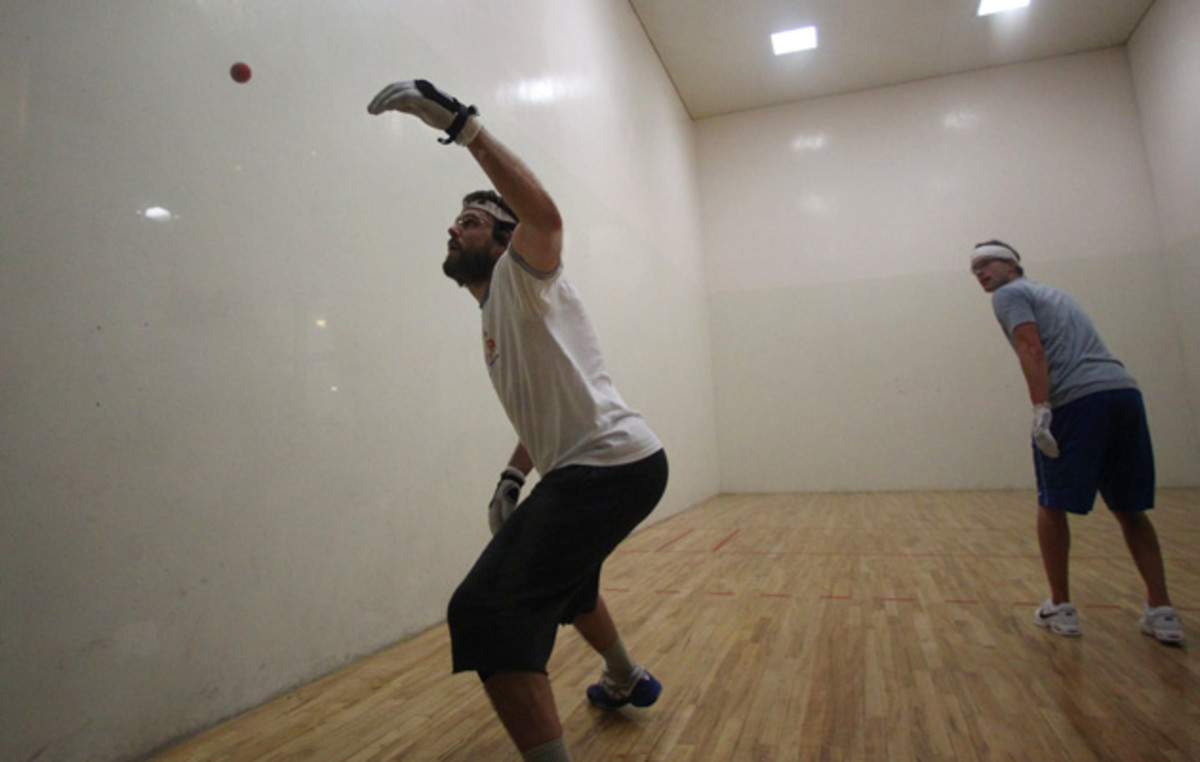
On Sunday the Helluva Handball tournament finishes shortly after noon. Chapman wins the singles title, while Eric Plummer loses in the doubles final. (Jake and Armijo lost in the second round, in a tiebreaker.) Once the equipment is packed, Jake loads the family's rickety old Jeep, the one that on startup roars like a garbage truck, and heads out with a carload of pro handball players. He drives south for 20 minutes, then winds down a two-lane road past barns and horses and pine trees. Finally he turns a corner and arrives at his rustic lake house.
Inside there are no signed helmets, game balls or oversized portraits of Plummer. Instead there are photos of the lake, a goofy carved wooden moose with his legs crossed, and pictures of Jake and Kollette at their wedding, held on a rocky outcropping in front of 25 people a half mile down the lake. There are also two energetic, frequently wet, Frisbee-toting dogs, Ray and Kosi, both of whom were adopted from a shelter. It is here, where Plummer spends his summers, that he says he feels most at peace. During his football career, on the day before he had to leave for camp, he would stand hip-deep in the water, staring out at the peaks ringing the lake, and cry.
Toss-ups: Which great players would you rather have going forward?
Four days earlier, when the handball pros first arrived, Jake took them out in his boat. When two of the handballers decided to take a dip in the lake, Plummer initially demurred, having forgotten his bathing suit, then changed his mind. "S---, you're right," he said. "What am I thinking, bringing you guys out here on my boat and not going in the water with you!" So he stripped down to a pair of black compression shorts and leaped off the back of the boat into the 57° water. Later he deemed the experience "awesome."
Today it's more mellow. Cornhole is played. Frisbees are tossed. Coronas are consumed. Plummer spends a good 10 minutes futilely looking for horseshoes he is sure are buried somewhere out on the beach. Then he's off to the kitchen to chop green peppers alongside his mom and his aunt, stopping every few minutes to make goofy faces at little Roland, who is in for a life of manly activities with his father. (Jake is already planning road trips for when Roland turns three.) Kollette, who is slim and pretty and as reserved as Jake is effusive, sits nearby preparing tortillas for tacos.
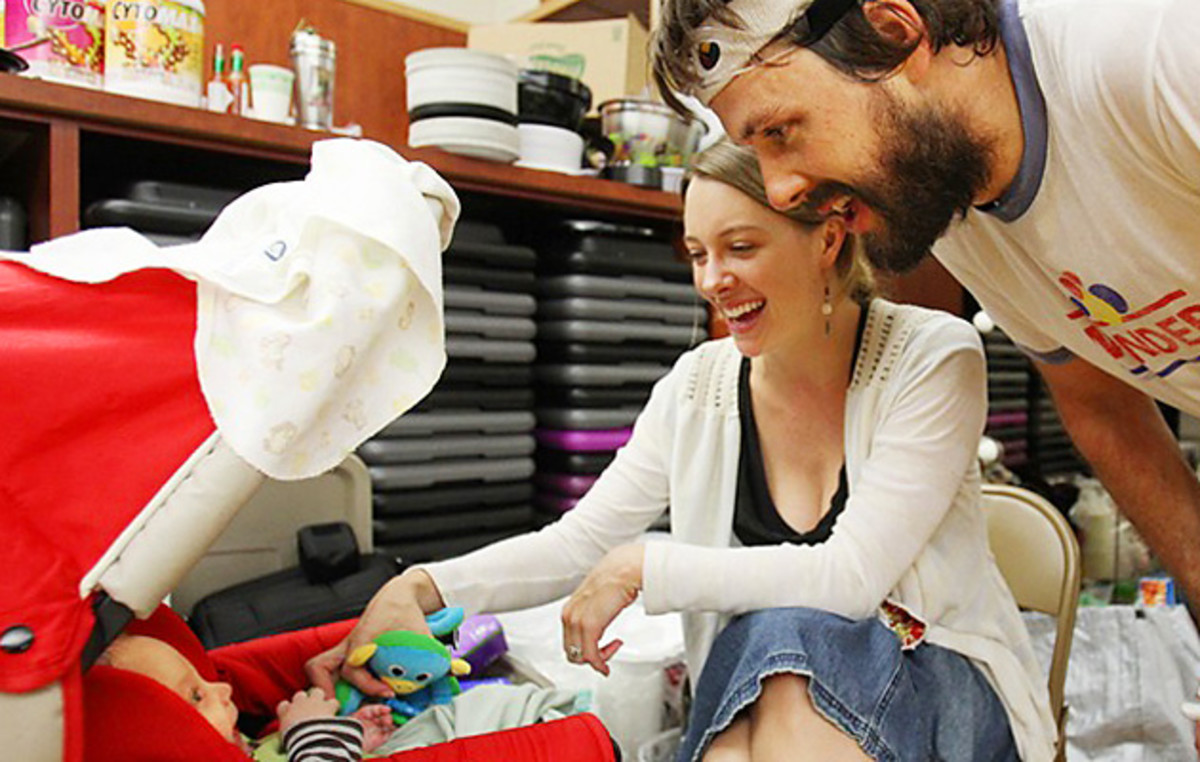
With dinner prep complete, Plummer is finally ready to talk about football. Heading to the beach, he grabs two Molsons, pulls up a pair of folding lawn chairs and aims them at the sunset. Sitting there, looking out at the lake, he starts talking. Of how he still has his knees, how he can run five miles without pain, how he spends afternoons in the hammock with Roland, how he can go backpacking with his brothers and spend weekends with his parents. He talks of how he misses some things about football, such as "throwing the ball on the run and coming out of the tunnel and the celebration and the screaming when you score a touchdown, and the other things that come out and you don't know where they come from." But he also talks of how his buddy Steve Christensen, an equipment manager with the Cardinals, used to call coaches Sperm because "they all come from that same pool of sperm—you know, two-a-days in the summer, the same you're-never-good-enough mentality." And he talks of how, if the Broncos had won it all in 2006, when he was having "a blast," he says, "I would have been on a jet plane, gone—that would have been a great way to leave." (Plummer says he made the actual decision to quit midway through that season.)
Building the perfect NFL quarterback
And why did he leave? Plummer thinks for a moment. "You gotta understand," he says, "I loved playing in the NFL. I put my heart and soul into it. And at that point, especially after Pat [Tillman died], it was like, there's so much more to do in life." He pauses. "And people go, ‘What, it's the NFL!’ I even told Gruden, 'Hey, I used to watch your games and check the stats. Your quarterback would throw like three picks, and you guys would still win. Now, you don't think I don't want to play for you guys? I can come down there and throw all the picks I want, and we're going to win. But you know what, I still don't want to play for you. It's not against you. It's because I don't want to play. And I don't want to do that to you. If I'm not willing to play, I'm not going to give what you need from me in order to succeed, and that's cheating you and that's cheating all those other players. I can't do that.'"
But what about the money? Plummer would have received $5 million even if he'd been a backup, which isn't exactly the worst gig in the country. Everybody knows pro athletes never turn down money, that it's a measuring stick for success and self-worth and status.
Plummer puts down his beer. "Yeah, I left five million on the table, but they paid me like 30 already," he says. "What was I going to do with five more? You know? S---. I know what it's like to grow up with hardly anything, and now they'd paid me all this money. I mean, I have some things I enjoy doing, but basically I could live on a budget like most every other normal American does. I don't spend money. But it never was about money. I played ball because I loved it. That's the beauty of handball, too. These guys want to make big contracts and all this stuff. But once you get into that realm of sports, there's just a control factor that might take the unstructured fun out of it. You know, the pure joy of it."
By now a few of the handball players have wandered over, and Plummer tells the story of his first big contract, in 2003. How his agent called him on a Friday night to update him on the negotiations. "He calls at 10:30, and I'm already in bed," remembers Plummer. "And he's like, Hey, we got them at eight, but I think we can get more.
"And I'm like, ‘Eight what?’
"And he's like, ‘Eight million.’
"I'm like, ‘What? You'll get more?’"
Plummer cracks up, incredulous. "I said, 'I'm going to bed, man, I need to get ready to play. Call me when you're done in the morning. This is ridiculous.' Like what ... the ... f---! I play a sport! I do the same stuff you guys do"—here Plummer gestures at the handball pros—"but I can throw a ball. I mean there are so many people who could probably do what I did but never had the opportunity or the guidance or the breaks."
• MMQB: Driving across America with John Madden
As for the life he left? In the four years since Plummer retired, the Broncos have gone 27--37. Shanahan was fired in '08. And last year a columnist for The Gazette suggested the "perfect candidate" for the Broncos' QB, a player who was "efficient," "knows how to win" and is "popular in the locker room": Jake Plummer.
Brett Favre, at age 45, says he could still play in the NFL
Gruden, for his part, eventually gave up on Plummer. "I've called, I've written, I've gone to see him... . I did everything I could," he said in 2008. Reached in December as rumors swirled that he might take over the 49ers, Gruden chuckled. "Good old Jake the Snake," he said. "If I got the Snake, I might still be coaching. He definitely walked away from the game too soon." But, Gruden added, "the guy has a lot of values. Maybe he was just more advanced than me. I'm looking at right now, and he was looking down the road."
As for Lincicome and his ideal of the athletic hero, look at some of those who bore the mantle when Plummer retired in 2007: Tiger Woods, Brett Favre, LeBron James. Now? Now they're deemed too egotistical, too unethical or too uncaring. They try to redeem themselves through Nike ads, using press conferences and P.R. firms to try to remake their images. Then, when all else fails, they try to win us back the only way they know how, through championships.
Heroes? Role models? Plummer doesn't see the point talking about them. He's more than happy to discuss the things that are important to him, like his friends, his family and the joy he gets from sports. He'll play an impromptu game of handball with a couple of random 16-year-olds, as he did at 11 p.m. on the Friday of his tournament in the near-empty athletic club, laughing and sweating. He'll say, "I love you, Dad," every time he parts ways with his father. He'll walk you to your car, ask about your kids, buy the first round, give someone a ride home. But that's not heroic; that's just being a decent person.
And where's the glory in that?
